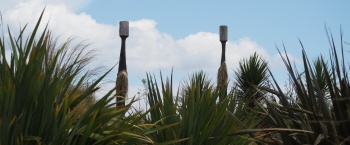Pā Harakeke programme
From WikiEducator
| Work in progress, expect frequent changes. Help and feedback is welcome. See discussion page. |
Traditional Maori textiles Department of Conservation - Harakeke
Contents
Pou
- Tane Mahuta and his daughter Hine-te-iwaiwa.
- People had nothing to snare birds with so Tane asked Hine-te-iwaiwa for help
- She created flax and is now known as the goddess of crafts
- Find out more - matau/mauī, carver of the pou, why they are dressed?
Tikaka/Guidelines
- Special place - stick to paths and ask questions
- Open to all, harvest with permission and food is discouraged
- Find out more - karakia, placing waste at base of plants
Koru
- 3 plant species
- Observe - flaxes for different purposes
- Look for animal signs - leaf eaters, poo
- Identify other species
- Wharariki
- Other plants
- Why were these other plants included
Kōrari/Kōladi
- Observe flower stalks - weight, size
- Shape of flower - beak of birds
- Touch and hold - drumming on the web
Weaving platform
- Pukawerawera the spider, web maker
- Weaving oral webs, raising a hand, one at a time conversations help share our stories
- Find more spider legends
Drama/mime
- Maori and pakeha uses of flax
- Groups receive different cards on harakeke/flax use
- 2 mins to think/practice
- Adults roving
- Demonstrate to group with assistance where required
- Pakipaki
- Play putaruo
Whakataukī
Hūtia te rito o te harakeke Kei hea te kōmako e kō? Kī mai ki ahau He aha te mea nui o tēnei ao? Māku e kī atu He tākata, he tākata, he tākata When the heart is torn from the flax bush, where then will the bellbird sing? If you ask me, what is the greatest thing in the world? I will reply, it is people
- Mime the story of Maui and the fish - web as waka, students choose Maui, remainder be brothers/sisters paddling, needing a fishing line...
- The story has it that Maui was not a good fisherman. He seldom went fishing with his brothers. One day, Maui decided to go fishing with them. The brothers told him that he was not allowed to come so Maui hid in the bottom of the boat Te waka-a-Maui. Once they were out to sea, Maui jumped out and surprised them. They refused to give him bait with which to fish so Maui broke his nose and dripped blood onto his grandmother's magical jawbone. He then cast it out to sea and caught the biggest fish of all—Te Ika-a-Maui, or, the North Island of New Zealand. The South Island is Te Waka a Maui better known as Te Waipounamu
Curriculum connections
Health and Physical Education
- Healthy Communities and Environments
- Students will:
- Identify and discuss obvious hazards in the pa harakeke and adopt simple safety practices
- Take individual and collective action to contribute to environments that can be enjoyed by all
Societal attitudes and values Explore how people's attitudes, values, and actions contribute to healthy physical and social environments Community resources Identify and use local community resources and explain how these contribute to a healthy community. Rights, responsibilities, and laws; People and the environment Contribute to and use simple guidelines and practices that promote physically and socially healthy classrooms, schools, and local environments.
Science
- Nature of Science Participating and Contributing, Planet Earth and Beyond, Living World
Social Sciences
- Place and Environment
Technology
- Technological Knowledge Technological Practice
Mathematics
- Geometry
And within Te Marautanga O Aotearoa: Hauora - Taiao (health and environment) Putaiao - Papatuanuku Hangarau - Concepts of hangarau Pangarau - Using pangarau Tiakanga-a-iwi - The changing world
